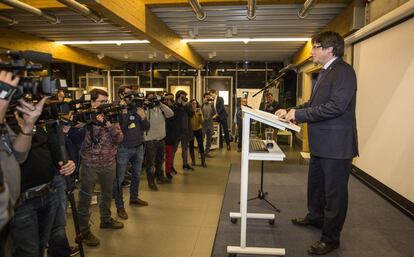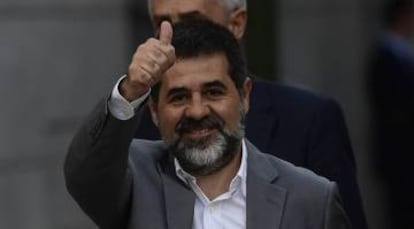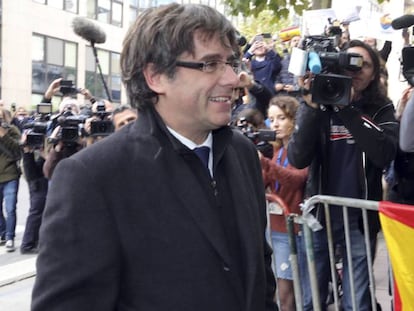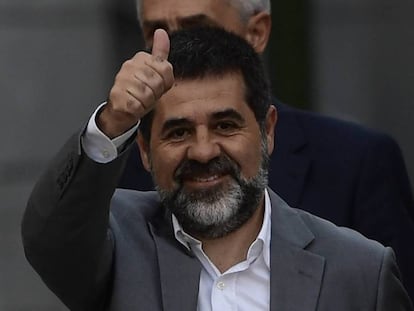Ousted Catalan premier withdraws bid to be voted back into post
In video address from Belgium, Carles Puigdemont proposes a jailed candidate and vows to fight the Spanish state

Ousted Catalan premier Carles Puigdemont on Thursday officially withdrew his nomination to lead the region again, and instead endorsed another independence activist who is currently in pre-trial detention in Madrid in connection with a rebellion probe against leaders of the failed secession bid.
In a video recording from Brussels, Puigdemont announced his “provisional” withdrawal and proposed Jordi Sànchez, the former head of a pro-independence association called Catalan National Assembly (ANC), as the next nominee to head Catalonia.
I will not yield, I will not renounce, I will not retreat before the illegitimate actions of those who lost at the polls
Carles Puigdemont
“Today I have instructed the speaker of the Catalan parliament to provisionally withdraw my nomination to the premiership, and I have asked him to initiate a round of talks as soon as possible with the various groups in parliament in order to elect a new candidate,” said Puigdemont in his address.
Sànchez’s Twitter account showed the following message shortly thereafter: “It is a great honor and a tremendous responsibility to be able to represent the people of Catalonia.”
In a further twist, Catalonia’s other main separatist party, the Catalan Republic Left (ERC), on Friday expressed dismay at Puigdemont’s open support for one of his own party members to succeed him in the race for the premiership. ERC spokesman Sergi Sabrià warned that the agreement “is not finalized” and that Puigdemont has leaped over “the line of legitimacy” by proposing Sànchez. “This role would clearly correspond to Oriol Junqueras,” he said, alluding to the ERC party leader – who is also in pre-trial detention as part of the same Supreme Court investigation.
Puigdemont’s decision had been widely expected despite outward shows of support for his candidacy. For weeks, separatist parties including the ousted leader’s own Together for Catalonia (JuntsxCat) had been negotiating the distribution of power in the new government they plan to form following the regional elections of December 21, which gave them a collective majority.

But it is unclear whether Jordi Sànchez will be any less of a non-starter than Puigdemont, who, as a fugitive from justice living in self-imposed exile in Belgium, refused to return to Spain for the parliamentary investiture debate required ahead of the appointment. Sànchez would have to request permission from Supreme Court Judge Pablo Llarena to attend the debate, and his earlier petitions for temporary release have so far been denied.
“Sànchez is number two on our list and he embodies the values of Together for Catalonia like nobody else; he is a man of peace, unjustly imprisoned in a Spanish jail,” said Puigdemont, who fled to Belgium shortly after the separatist majority in the Catalan parliament passed a unilateral declaration of independence in late October in violation of Spanish and Catalan legislation. In response, Madrid invoked special constitutional powers, sacked the Catalan government, imposed direct rule and called early elections in the region.
But the separatist majority that emerged from that election has been backing candidates who are caught up in legal troubles in connection with a Supreme Court investigation into rebellion, secession and misuse of public funds by former officials of the Catalan government.
The new Catalan parliament speaker, Roger Torrent, had said that there was no other possible candidate than Puigdemont, and on January 30 he indefinitely suspended the investiture debate when it became clear that the latter could not be legally appointed. This has left Catalan politics in limbo and facing the prospect of a fresh election if the impasse is not overcome soon.
A parliamentary source said that Torrent will begin talks with other parties next week in order to schedule a new investiture session. Opposition parties, including the unaligned Catalunya en Comú-Podem, have been asking separatists to unblock the situation so that self-rule may be restored to the region.
More gridlock?
But the decision to nominate a candidate who is currently in prison could mean more gridlock. Prime Minister Mariano Rajoy has already said that central rule will remain in place as long as there is no candidate who can legally be appointed and effectively carry out his or her daily duties as regional premier.
Plans B and C
Aware that Sànchez’s candidacy could be doomed to fail, there is already a third candidate on the sidelines: Jordi Turull, a former government official who is also caught up in the rebellion probe, but who is not in preventive detention, a fact that would enable him to attend the investiture debate. And if he were to ultimately be found guilty by the courts and barred from holding public office, there is another name on the list: Elsa Artadi, a former direct aide of Puigdemont’s who is not under investigation.
Opposition parties in Catalonia have voiced similar concerns. “Puigdemont cannot be the premier, and now he wants his legacy to be another dead-end proposal,” said Salvador Illa, the organization secretary for the Catalan Socialists (PSC).
Despite his decision to step aside, Puigdemont sought to underscore that he will remain active in politics. In an address that reiterated his portrayal of Spain as an authoritarian state, he insisted that “I will not yield, I will not renounce, I will not retreat before the illegitimate actions of those who lost at the polls. Or before the arbitrariness of those who are willing, they say, to pay the price of abandoning the rule of law and justice in order to defend the unity of the homeland. I fully trust that we will win. And that one day, I hope very soon, I will be able to return to Catalonia as a free man.”
He also announced that he has taken his case to the United Nations, where he is charging Spain with violating the Universal Declaration of Human Rights. In the meantime, Puigdemont will be put in charge of a symbolic institution that separatists aim to create in Brussels, the Council of the Republic, where his role will be to drum up international support for the separatist cause.
English version by Susana Urra.
Tu suscripción se está usando en otro dispositivo
¿Quieres añadir otro usuario a tu suscripción?
Si continúas leyendo en este dispositivo, no se podrá leer en el otro.
FlechaTu suscripción se está usando en otro dispositivo y solo puedes acceder a EL PAÍS desde un dispositivo a la vez.
Si quieres compartir tu cuenta, cambia tu suscripción a la modalidad Premium, así podrás añadir otro usuario. Cada uno accederá con su propia cuenta de email, lo que os permitirá personalizar vuestra experiencia en EL PAÍS.
En el caso de no saber quién está usando tu cuenta, te recomendamos cambiar tu contraseña aquí.
Si decides continuar compartiendo tu cuenta, este mensaje se mostrará en tu dispositivo y en el de la otra persona que está usando tu cuenta de forma indefinida, afectando a tu experiencia de lectura. Puedes consultar aquí los términos y condiciones de la suscripción digital.










































